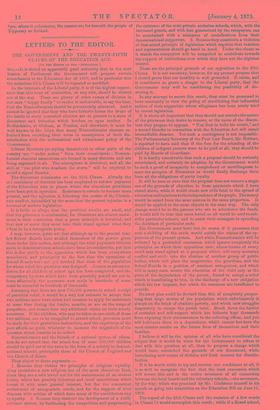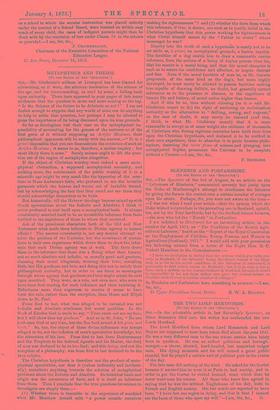LETTERS TO THE EDITOR.
THE GOVERNMENT AND THE TWENTY-FIFTH CLAUSE OF THE EDUCATION ACT.
[TO THE EDITOR OF THE "SPECTATOR-"]
SIR, —It is stated on apparently good authority that in the next Session of Parliament the Government will propose certain amendments to the Education Act of 1870, and in particular that the notorious 25th Clause will be repealed or modified.
In the interests of the Liberal party, it is of the highest import- ance that this bone of contention, at any rate, should be cleared out of the way. There are plenty of other causes of division in our once "happy family" to render it undesirable, to say the least, that the Nonconformists should be permanently alienated. And it cannot be ignored that they who have hitherto borne the brunt of the battle in every contested election are at present in a state of discontent and irritation which borders on open mutiny. In Bedfordshire, at Oldham, at Preston, and elsewhere, it must be well known to Mr. Glyn that many Nonconformist electors re- frained from recording their votes in consequence of their dis- satisfaction with the ecclesiastical and educational policy of the Government.
Liberal Members (so styling themselves) in other parts of the country are "under notice" from their constituents ; Noncon- formist electoral associations are formed in many districts and are being organised in all. The atmosphere is electrical, and all the skill of "the pilot who weathers the storm" will be required to avoid a signal disaster.
The discontent culminates on the 25th Clause. Already the old machinery of distraint has been employed to enforce payment of the Education rate in places where the obnoxious provisions have been put in operation. Resistance is certain to become more general, and the agitation is following the course of the Church- rate conflict, intensified by the sense that the present,injustice is a reversal of modern legislation.
It is futile to allege that the practical results are small, and that the grievance is sentimental, for Dissenters are almost unani- mous in their conviction that a great principle is involved, and that now or never they must take their stand against what they affirm "to be a retrograde policy.
I may, however, point out that although up to the present time few School Boards have availed themselves of the powers given them under this section, and although the total payments hitherto made to denominational schools have been inconsiderable, yet that this is due partly to the opposition which has been everywhere manifested, and principally to the fact that the operations of School Boards have not yet reached that class of the population for whose relief tins provision was designed. As soon as accommo- dation for all children of school age has been completed, and the compulsory by-laws which have been generally passed are put in force effectually, the payments now made in hundreds of cases must be extended to hundreds of thousands.
Assuming that there are now 700,000 persons in actual receipt of parochial relief, it would be a very low estimate to accept that two millions more have either had occasion to apply for assistance at some time during the twelve months, or are on the verge of pauperism, and cannot bear any additional strain on their scanty resources. If the children, who may be taken as one-sixth of these two millions, are to be compelled to attend school, provision must be made for their gratuitous instruction, and the experience of the past affords no guide whatever to measure the magnitude of the question which remains to be solved.
Nonconformists and the friends of a national system of educa- tion do not intend that the school fees of some 300,000 children should be paid out of the rates in the form of a subsidy to denomi- national schools, principally those of the Church of England and the Church of Rome.
They object to these payments:- 1. Because they violate the principles of religious equality. They constitute a new religious tax of the most obnoxious kind, since they are a rate levied not for the maintenance of an ancient fabric, which has possibly historical and local associations which invest it with some general interest, but for the concurrent endowment of antagonistic creeds, and for the support of rival dogmas, with neither of which have many of the contributors any sympathy. 2. Because they obstruct the development of a really national system, by facilitating the competition and perpetuating the existence of the semi-private sectarian schools, which, with the increased grants, and with fees guaranteed by the ratepayers, can be maintained with a minimum of contributions from their denominational supporters. 3. Because they constitute a violation of that sound principle of legislation which requires that taxation and representation should go hand in hand. Under the clause as it stands the ratepayers will be compelled to contribute towards the support of institutions over which they have not the slightest control.
These are the principal grounds of our opposition to the 25th Clause. It is not necessary, however, for my present purpose that I should prove that our hostility is well grounded. It exists, and it constitutes so grave a danger to the Liberal party, that the Government may well be considering the possibility of dis- arming it.
In any attempt to secure this result, they must be presumed to have constantly in view the policy of conciliating that influential section of their supporters whose allegiance has been sorely tried by recent legislation.
It is above all important that they should not mistake the nature of the grievance they desire to remove, or the cause of the discon- tent they propose to appease. "Non licet in bello bis errare," and a second blunder in connection with the Education Act will entail irremediable disaster. Yet such a contingency is not impossible. The Parliamentary Secretary of the Poor Law Board, Mr. Hibbert, is reported to have said that if the fees for the schooling of the children of indigent parents were to be paid at all, they should be paid by Boards of Guardians.
It is hardly conceivable that such a proposal should be seriously entertained, and certainly its adoption by the Government would be such a proof of incapacity to comprehend or unwillingness to meet the scruples of Dissenters as would finally discharge them from all the obligations of party loyalty.
It will be seen at once that the proposal does not remove a single one of the grounds of objection to these payments which I have stated above, while it would create new evils fatal to the spread of education and injurious to the independence of the people. The money would be raised from the same sources in the same proportion. It would be applied to the same objects in the same way. The only change would be in the persons who are to administer the funds. It would still be true that rates levied on all would be used to sub- sidise particular schools, and to assist their managers in spreading the doctrines of particular sects.
The Government must have lost its senses if it presumes that such a shifting of the cards would satisfy the claims of the op- ponents of the present system. And while Nonconformists will be irritated by a pretended concession which ignores completely the principles on which their opposition rests, educationists of every creed may stand aghast at a proposal which will carry sectarian conflict and strife into the election of another group of public bodies, which will place the magistrates, the guardians, and the School Boards in a position of constant antagonism, and which will in many cases secure the education of the child only at the price of the degradation of the parent, forced to accept a relief which is humiliating to him, in the discharge of a new obligation which the law imposes, but which his resources are insufficient to provide.
No surer plan could be devised than this of completely pauper- ising that large section of the population which unfortunately is always on the brink of absolute poverty, and which now struggles desperately to escape the parish taint. Break down the barrier of restraint and self-respect which has hitherto kept thousands from exposing their circumstances to the relieving officer, and you will habituate them to a dependence which cannot but have the most sinister results on the future lives of themselves and their families.
I believe it will be the opinion of all who have considered the subject that it would be wiser for the Government to refuse to deal with this question at all, than to propose a change which would leave untouched the grounds of our discontent, while introducing new causes of division and fresh reasons for dissatis- faction.
If it be worth while to try and recover our confidence at all, it is as well to recognise the fact that the least concession which will secure this end is the entire severance of all connection between the local boards and the voluntary schools,—the severance, by the way, which was promised by Mr. Gladstone himself in his speech on going into committee on the Education Bill on June 16, 1870.
The repeal of the 25th Clause and the omission of a few words in Clause 74 would accomplish this result ; while if a Board school, or a school in which the secular instruction was placed entirely tinder the control of a School Board, were insisted on within easy -reach of every child, the cases of indigent parents might then be -dealt with by the remission of fees under Clause 74 in the schools so provided.—I am, Sir, &c.,
J. CHAMBERLAIN,
Chairman of the Executive Committee of the National Education League.
17 Ann Street, December 16, 1872.











































 Previous page
Previous page